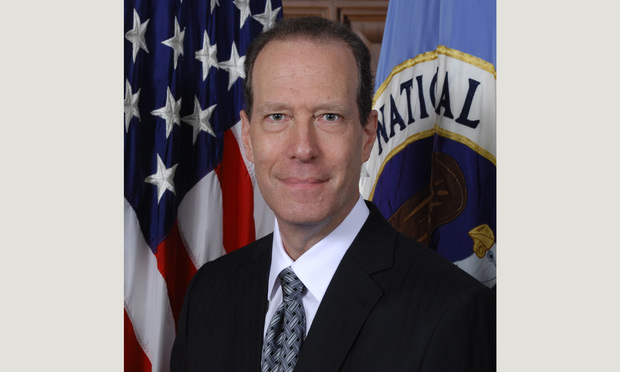NSA General Counsel Glenn Gerstell Moves Cyber Work to Think Tank
Glenn Gerstell, who spent much of the last five years pounding a steady drumbeat warning of a global cyber pandemic, has left his job as general counsel at the U.S. National Security Agency.
February 03, 2020 at 04:02 PM
4 minute read
 Glenn Gerstell, former general counsel of the NSA
Glenn Gerstell, former general counsel of the NSA
Glenn Gerstell, who spent much of the last five years pounding a steady drumbeat warning of a global cyber pandemic, has left his job as general counsel at the U.S. National Security Agency. His last day was Jan. 31.
Gerstell will be a senior adviser at the Center for Strategic & International Studies in Washington, D.C., beginning this month. The center, a nonpartisan think tank on global challenges, was not immediately able to provide a start date.
Gerstell took the National Security Agency's general counsel job in 2015 after working 40 years at Milbank, Tweed, Hadley & McCloy, where he served as managing partner of the firm's Washington, D.C., Singapore and Hong Kong offices.
At the spy agency, he oversaw about 100 attorneys who "functioned in a manner comparable to corporate in-house counsel," according to an online description of his office structure. He reported to the U.S. Department of Defense general counsel.
Asked for comment, the agency Monday referred Corporate Counsel to a speech Gerstell made Jan. 15 to an American Bar Association committee. In the speech, he said, "It is almost impossible to overstate the gap between the rate at which the cybersecurity threat is getting worse relative to our ability to effectively address it. The simple fact of the matter is that no nation has yet found an effective solution to stop foreign malevolent cyberactivity."
The speech discussed three key points that challenge national security:
- Technology is less susceptible to or contained by national boundaries, with other countries, especially China, having the potential to surpass U.S. advances.
- Cross-border cyberactivity makes "it harder to hold a foreign nation-state accountable for domestic damage. All of this introduces extraordinary complexity into international relations and national security arrangements."
- The balance between the federal government and the private sector in the area of technology is undergoing rapid, significant change, with the private sector in the lead. "The extent to which this puts effective power in the hands of the private sector and the extent to which the private sector is permitted or required to share that information with the government will be a defining public policy question of the next decade."
Citing his upcoming departure, Gerstell concluded his speech by praising the men and women at the spy agency.
"Having had the privilege of assisting on the front lines in national security efforts," he said, "I am confident that we have intellectual ability, moral integrity, skills and dedicated professionals across the intelligence community and defense establishments. In short, I have no doubt that we are capable of addressing these challenges. But it will require a broad and integrated effort to do so, and I know that the lawyers in the national security sector… can and should be in the vanguard in addressing these challenges."
The speech was a calmer version of a lengthy opinion article Gerstell wrote for the New York Times last September in which he warned that "the unprecedented scale and pace of technological change will outstrip our ability to effectively adapt to it."
He went on to write, "The digital revolution has urgent and profound implications for our federal national security agencies. It is almost impossible to overstate the challenges … The short period of time our nation has to prepare for the effects of this revolution is already upon us, and it could not come at a more perilous and complicated time."
The article cited the "extraordinary economic and political power" that technology puts in the hands of the private sector, and its "potential for a pernicious effect on the very legitimacy and thus stability of our governmental and societal structures."
Gerstell served on the President's National Infrastructure Advisory Council, which reports to the president and the secretary of Homeland Security on security threats to the nation's infrastructure, as well as on the District of Columbia Homeland Security Commission.
A graduate of New York University and Columbia University School of Law, he previously served as an adjunct law professor at the Georgetown University School of Law and New York Law School.
When he retired from Milbank in 2015, Gerstell said of his new national security job, "There is a tremendous level of technical expertise here. At this agency, everyone is mission-driven; they truly want to be here. They probably could be making lots more money working at Facebook or Microsoft, but they're here because they believe they are doing something important—and they are."
This content has been archived. It is available through our partners, LexisNexis® and Bloomberg Law.
To view this content, please continue to their sites.
Not a Lexis Subscriber?
Subscribe Now
Not a Bloomberg Law Subscriber?
Subscribe Now
NOT FOR REPRINT
© 2025 ALM Global, LLC, All Rights Reserved. Request academic re-use from www.copyright.com. All other uses, submit a request to [email protected]. For more information visit Asset & Logo Licensing.
You Might Like
View All

Global Software Firm Trying to Jump-Start Growth Hands CLO Post to 3-Time Legal Chief

Meta Workers Aren't of One Mind on Company's Retreat From DEI, Fact-Checking

Ad Agency Legal Chief Scores $12M Golden Parachute in $13B Sale to Rival
3 minute readLaw Firms Mentioned
Trending Stories
- 1Starbucks Sues Ex-Executive to Recover $1M Signing Bonus
- 2Navigating AI Risks: Best Practices for Compliance and Security
- 320 New Judges? Connecticut Could Get Wave of Jurists
- 4Orrick Loses 10-Lawyer Team to Herbert Smith in Germany
- 5‘The US Market Is Critical’: KPMG’s Former Head of Global Legal Services On the Legal Arm of the Big Four Firm Entering the US
Who Got The Work
J. Brugh Lower of Gibbons has entered an appearance for industrial equipment supplier Devco Corporation in a pending trademark infringement lawsuit. The suit, accusing the defendant of selling knock-off Graco products, was filed Dec. 18 in New Jersey District Court by Rivkin Radler on behalf of Graco Inc. and Graco Minnesota. The case, assigned to U.S. District Judge Zahid N. Quraishi, is 3:24-cv-11294, Graco Inc. et al v. Devco Corporation.
Who Got The Work
Rebecca Maller-Stein and Kent A. Yalowitz of Arnold & Porter Kaye Scholer have entered their appearances for Hanaco Venture Capital and its executives, Lior Prosor and David Frankel, in a pending securities lawsuit. The action, filed on Dec. 24 in New York Southern District Court by Zell, Aron & Co. on behalf of Goldeneye Advisors, accuses the defendants of negligently and fraudulently managing the plaintiff's $1 million investment. The case, assigned to U.S. District Judge Vernon S. Broderick, is 1:24-cv-09918, Goldeneye Advisors, LLC v. Hanaco Venture Capital, Ltd. et al.
Who Got The Work
Attorneys from A&O Shearman has stepped in as defense counsel for Toronto-Dominion Bank and other defendants in a pending securities class action. The suit, filed Dec. 11 in New York Southern District Court by Bleichmar Fonti & Auld, accuses the defendants of concealing the bank's 'pervasive' deficiencies in regards to its compliance with the Bank Secrecy Act and the quality of its anti-money laundering controls. The case, assigned to U.S. District Judge Arun Subramanian, is 1:24-cv-09445, Gonzalez v. The Toronto-Dominion Bank et al.
Who Got The Work
Crown Castle International, a Pennsylvania company providing shared communications infrastructure, has turned to Luke D. Wolf of Gordon Rees Scully Mansukhani to fend off a pending breach-of-contract lawsuit. The court action, filed Nov. 25 in Michigan Eastern District Court by Hooper Hathaway PC on behalf of The Town Residences LLC, accuses Crown Castle of failing to transfer approximately $30,000 in utility payments from T-Mobile in breach of a roof-top lease and assignment agreement. The case, assigned to U.S. District Judge Susan K. Declercq, is 2:24-cv-13131, The Town Residences LLC v. T-Mobile US, Inc. et al.
Who Got The Work
Wilfred P. Coronato and Daniel M. Schwartz of McCarter & English have stepped in as defense counsel to Electrolux Home Products Inc. in a pending product liability lawsuit. The court action, filed Nov. 26 in New York Eastern District Court by Poulos Lopiccolo PC and Nagel Rice LLP on behalf of David Stern, alleges that the defendant's refrigerators’ drawers and shelving repeatedly break and fall apart within months after purchase. The case, assigned to U.S. District Judge Joan M. Azrack, is 2:24-cv-08204, Stern v. Electrolux Home Products, Inc.
Featured Firms
Law Offices of Gary Martin Hays & Associates, P.C.
(470) 294-1674
Law Offices of Mark E. Salomone
(857) 444-6468
Smith & Hassler
(713) 739-1250






